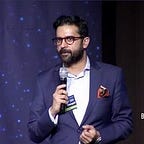Amalgamation of DAO and AI for the perfect organization
DAO-a term that is used yet feared by many. We all know why to be skeptical about it and, only few talks about the plethora of opportunities it can create for the future world. Decentralized Autonomous Organizations are at an embryonic stage with a great potential of revolutionizing businesses. But what does a DAO really mean and why is it seen in a bubble of negative perceptions?
A DAO is an organization that operates on Blockchain platform without the interference of any central authority. The decisions made within such an organization are a product of written computer codes or a consensus among its members achieved through voting systems. Essentially, a DAO is a business that is ruled by hard coded rules which define the course of action of the organization.
In this manner, the tyranny of centralization can be combated with the rigidity of decentralization achieved through Blockchain. I agree that the first attempt at it in May 2016 by few members of the Ethereum community was disastrous but then the first attempt at things usually fail. The first plane crashed multiple times and the first bulb glowed after thousands of failed attempts. It takes repeated failures to make a product or business perfect and I am hoping the same from DAOs.
The reason behind the distrust in people was the hacking of the system which led to a theft of 3.6 million Ether which were priced USD 50 million at the time. The hacker took advantage of some of the code of the DAO’s smart contract to gain access to this amount, exposing the smart contracts to scrutiny from public. However, it was the codes in the smart contracts that restricted the hacker from exchanging his Ether into official currency. The code kept a waiting period for the withdrawal of funds which gave the investors enough time to take steps to safeguard their investments. Presently, the stolen amount is stored in ETH, still owned by hacker but not withdrawable by anyone.
This incident demonstrates the impossibility of establishing fully decentralized autonomous organizations with current methodologies of running DAOs. It is because we still require a person or a group of people to govern the system, upgrade the network and maintain equal and fair distribution of governance by ensuring participation of all members of the organization. The true essence of DAO gets lost in between and makes it vulnerable to attacks.
The solution we are looking at is provided by an Artificial Intelligence run Decentralized Autonomous Organization.
How is that you ask me? The current scenarios is technological realm has restricted the interoperability of AIs that has created a deep trench between the opportunities provided by this technology and our ability to access them. The strengths and capabilities of individual AIs are still left unexplored and unchanneled. Also, AIs are individually walking on the path of advancement, separately achieving goals and developing several useful characteristics.
In this respect, if both the technologies are conjoined, they will create a platform where both of them grow and help the other to flourish. This can be done through the following ways:
- An amalgamation of AIs and DAOs can not only make a DAO fully decentralized and autonomous but also create a platform for AIs to access fellow AIs capabilities and resources.
- DAOs can have AI agents which will be held responsible for carrying out network decisions, replacing the need of holding voting sessions for each and every decision.
- Since AIs will be unbiased and thoroughly trained to be able to make decisions with a fair and practical perspective, all members of the organizations will be able to trust them. A consensus would be maintained within the organization without anyone having to actually participate in the decision-making process.
- Incorporation of AI agents in a DAO’s network will greatly simplify and optimize the governance mechanisms while maintaining transparency and the true essence of decentralization and autonomy within the organization.
- The problems of voting, security, reputation management systems, upgradeability, governance, maintaining consensus, etc. can be skillfully tackled by AI agents without the intervention of a human.
Establishment of fully decentralized and autonomous organizations run by AI agents can take years of development timeline. However, the outcome of this unification will be worth the effort, time and money invested in it.
